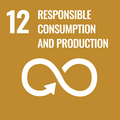12- Responsible Consumption and Production
Office Paper Purchasing
Total annual expenditures on office paper: 95,881 US/Canadian $
Expenditures on office paper with the following levels of post-consumer recycled, agricultural residue, and/or FSC certified content:
| Expenditure Per Level | |
| 10-29 percent | 0 US/Canadian$ |
| 30-49 percent | 93,631 US/Canadian$ |
| 50-69 percent | 0 US/Canadian$ |
| 70-89 percent (or FSC Mix label) | 0 US/Canadian$ |
| 90-100 percent (or FSC Recycled/100% label) | 2,250 US/Canadian$ |
Time period from which the figures reported above are drawn:
Academic year 2021-2022: from May 1st 2021 to April 30 2022.
Website URL where information about the institution’s paper purchasing is available: http://sium.umontreal.ca/developpement-durable.html
Additional documentation:
- Paper purchased by the Services d'Impression of University of Montreal (SIUM, Printing Services) only.
- Paper Purchases by academic units are allowed but is at their discretion.
Electronics Purchasing
Total annual expenditures on electronics: 3,054,480 US/Canadian $
Energy STARS labeled : 2,595,564 $
Expenditures on environmentally or socially preferable electronics:
| Expenditure Per Level | |
| EPEAT Gold registered and/or third party certified at the highest achievable level under a multi-attribute sustainability standard | 2,754,416 US/Can. $ |
| EPEAT Silver registered and/or third party certified at mid-level under a multi-attribute sustainability standard | 55,222 US/Canadian $ |
| EPEAT Bronze registered and/or third party certified at minimum level under a multi-attribute sustainability standard | 34,624 US/Canadian $ |
| Labeled under a single-attribute standard | 178,685 US/Can. $ |
Time period from which the figures reported above are drawn:
May 2020 to April 2021
Equipment considered is owned and managed by the University of Montreal. The purchase of other equipment by academic and research units is allowed and is at their discretion. DGTIC however, provides specifications and guidance for employees of the University of Montreal on the standardization of equipment, including the concept of total cost of ownership (TCO).
Sustainable Procurement
The University of Montreal is committed to sustainable development and expects the same commitment from its suppliers as well as ethical sourcing practices throughout their supply chain. The code of conduct demonstrates an institutional commitment to work for continuous improvement towards excellence.
Suppliers of goods and services are expected to subscribe and to ensure that their operating practices and those of their own suppliers are in sync with the commitments of the University's code of conduct.
Copy of directives: Code_de_ConduiteV4_Final .pdf
Consumable office products:
Paper purchased by the University’s Printing Services must contain 30% of post-consumer recycled fiber
Printing Services also establish other sustainability criteria for asks of interest in order to compare products and make sustainable decisions.
These criteria include:
- weight
- FSC certification
Furniture and furnishings:
In collaboration with the Sustainability Unit, the Procurement and Contract Management Branch developed a series of criteria for the latest call for tenders for the acquisition of office furniture for recurring needs at the University.
These criteria cover several areas:
-durability and robustness
-Indoor air quality
-LEED
-recyclability
takeover of pre-existing equipment
-maintenance of equipment
-Delivery and installation of equipment.
Information Technology (IT) and equipment:
Although asks of interest do not mention it explicitly, the Direction Générale des technologies de l'information et des Communications (DGTIC) requires that all computers meet the EPEAT gold standard at the stage of equipment standardization.
Food service providers:
In accordance with its Fair Trade Campus certification (Fairtrade Canada), the University's food services purchase only Fair Trade Certified coffee. The supplier must also offer fair trade tea choices so that at least one option is available to the customer at all times at the point of service.
